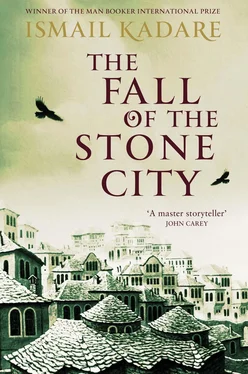The prisoner said he was no longer in a fit state. He would try to say more tomorrow.
After a whispered consultation, the investigators told him he could rest.
After the plane that had brought the German investigator, for the second time that week a light aircraft landed at the city’s airport. The airport had been virtually abandoned for ten years and this increase in traffic was striking. The first time, they barely managed to clear the runway of weeds and there had been no question of landing lights. In anticipation of the aircraft’s arrival, men holding torches had stood for hours in the February cold. Fortunately this second plane landed in the afternoon. At the last moment the wind from the Tepelene Gorge to the north of the city, as keen as ever, almost brought it down.
Clearly something extraordinary was happening, but few associated it with the interrogation in the Cave of Sanisha.
The man who disembarked from the second aircraft was a Russian investigator. His German counterpart with his gaunt, lined face had been a formidable presence, but this Russian looked unassuming. He was portly, almost bald and walked with an avuncular amble.
Shaqo Mezini and Arian Ciu came to the airport to meet him. At first they were visibly disappointed, but their conversation with him as they walked from the runway to the little airport building made them change their minds. They quickly realised that this person must be important. They all spoke fluently in Russian and before even reaching the hotel, the two Albanian investigators felt certain that this man had come straight from the Kremlin.
They talked in a secluded corner of the hotel. The Russian grasped the situation at once, as if he had been dealing with the case for years. He had come to provide assistance. He made it clear that he had experience of trials in Moscow that had been kept from the public.
The Albanians described for him how the investigation stood. They told him about the German investigator’s help, about the moments when they hoped the doctors would crack and other aspects of the case about which they did not feel so confident.
The Russian gave extraordinarily detailed instructions. In the first session they would test the prisoners’ sincerity, especially Big Dr Gurameto’s. Everything else depended on this. They would try to obtain precise answers to certain questions. What had the doctor and his foreign guest said in their private conversations during the dinner? What did the doctor know about German intentions towards Albania? There had been talk of secret discussions before the invasion with a group of pro-German Albanians who would take over the country’s government. What had been Dr Gurameto’s role in this group, if any? Why had he felt in such a strong position, almost equal to the German colonel? Where had he found the courage to speak up for the hostages, especially Jakoel the Jew? What did the Germans think about their massacre of civilians at the village of Borova? Did they feel remorse? Or did they pretend to? Who had waved that white sheet as a sign of the city’s surrender? If there was no truth in this story of the white sheet, who made it up, the Albanians or the Germans?
The two Albanians were reluctant to interrupt the Russian, but expressed their surprise. So far they had thought they were investigating the great Jewish plot, but now they were being asked about the German occupation.
As their discussion came to an end, the Russian investigator’s eyes gleamed. He understood what the Albanians were trying to say, but he was leading up to this. Testing the prisoner’s sincerity was merely a preparation for the final stage. First they had to make it clear to him that there was nothing that they didn’t know.
The Russian explained that the revelation of private conversations was the most effective of all possible methods of interrogation. The prisoner might imagine all kinds of things, but never that they could know what he said in private. When he realised that they did, he would be overcome with terror.
The Albanian investigators stared at the Russian in admiration.
“Don’t look so astonished,” the Russian said. “I know my job and this is no bluff. We know all these things, maybe better than the prisoner does himself. For instance, we might remind him of the phrase he used, ‘I’m not Albania, Fritz, just as you aren’t Germany. We’re something else.’”
“Excuse me,” said Shaqo Mezini. “This means that Fritz von Schwabe is still alive and he has told you of the events of that night.”
“No,” the Russian butted in. “He’s dead. Our German colleagues have confirmed this.”
The Russian’s clear eyes glittered with enthusiasm. The mysterious colonel really had died, but for the moment the two Albanians need not be told anything more. He knew from experience that premature revelations spoilt the proceedings. For the moment they should concentrate on this matter of private conversations. They were the key to everything.
The next interrogation session would be decisive. The prisoner had promised to talk. The Russian investigator would watch through that same hole in the wall that Ali Pasha Tepelene had used, following for entire nights the torture of the men who had raped his sister.
“Good God, he even knows about that,” muttered Arian Ciu.
“What?” asked the Russian. The Albanians’ awe of him was obvious, and again their visitor’s glassy eyes glistened.
At midnight Big Dr Gurameto was led into the Cave of Sanisha alone. This was the first time he had been interrogated without the little doctor. The handcuffs which had tied him to the other man’s right hand dangled from his wrist and his movements were clumsy. Without his colleague he felt an empty space beside him.
“You promised to talk,” Shaqo Mezini said softly.
The prisoner nodded.
The questioning that night was long and tiring but the investigators did not intervene as they had in other sessions, when they had thought that a crossfire of interruptions was the best way to unsettle their victim. They now realised that not interrupting was just as disorienting.
It struck the doctor that they were making him talk with the express purpose of wearing him down. He told them what he knew about the secret talks with the Germans before the invasion. Of course the Germans had kept a file on Albania and had their people in place. The group of German sympathisers was large. The cream of the nationalist elite, as they were known, all either had a German cultural background or supported the Germans. They included Mehdi and Mit’hat Frashëri, from the most famous Albanian family of all; the great Albanian linguist Eqrem Çabej; the country’s most admired poet, Lasgush Poradeci; Father Anton Harapi, a figure of uncompromised moral stature; the renowned scholar, Lef Nosi; the distinguished Kosovo politician Rexhep Mitrovica and dozens of others.
Gurameto, the celebrated surgeon, expected them to ask him where he stood, so he told them himself. He had known many of these people but he did not count himself among this elite and still less was he a collaborator, any more than Çabej and Poradeci were. He did not hide that he had been inclined, tempted, like many who had studied in Germany, but this should not be confused with Nazism. It was an attraction to Germany, as was only natural. A lot of things were not as clear then as they later became. He was a surgeon and sometimes he performed ten operations in one day. He had no time for anything else. He would come home at midnight still wearing his white coat.
Finally they butted in to remind him that the question was about the secret talks before the invasion.
Of course he had heard about them, and in fact knew a good deal. The Germans had made preparations, knowing they would enter Albania sooner or later. So they had discussed certain matters in advance with their sympathisers in Albania. The essential point was that the Germans would come as liberators and not an occupying power. This meant observing certain conditions: there would be no murderous reprisals and the customs of the country would be respected, especially where Albanian honour and women were concerned. The doctor was aware of these things.
Читать дальше












